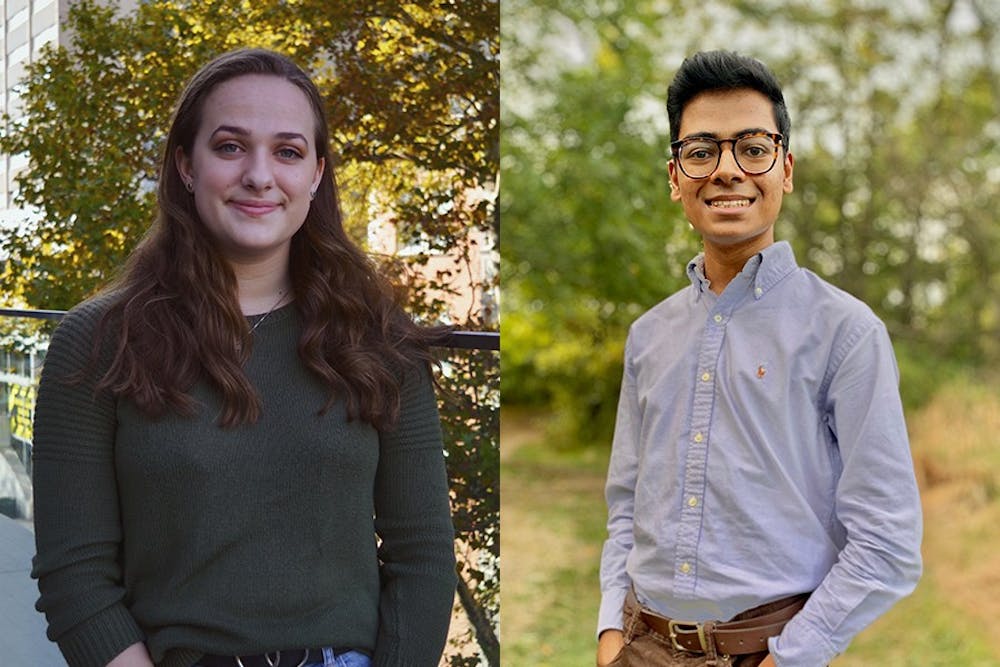
Tori Borlase (left) and Nikhil Gupta (right) spoke at the final Undergraduate Assembly presidential debate on Apr. 13. (Photo of by Sally Chen and photo from Nikhil Gupta)
Candidates for Undergraduate Assembly president met for the second of two debates on Tuesday night, less than one day before the voting period is set to close.
College junior Tori Borlase and College and Wharton junior Nikhil Gupta fielded questions from the moderator, College senior and Nominations and Elections Committee Vice Chair for Education Omar Bakri, about how they plan to pursue their respective agendas if elected.
In response to a question about how each candidate would advocate for Penn to pay Payments In Lieu of Taxes to benefit Philadelphia public schools, Gupta said that because the administration is unlikely to meet with Penn for PILOTs — a coalition of faculty and staff calling on Penn to pay PILOTs — the UA should take a more active role in bringing this concern to administration than it has in the past.
Gupta added that advocating for PILOTs in meetings with Penn President Amy Gutmann and Provost Wendell Pritchett would create pressure from the top of the University.
Borlase, however, said she would focus on convincing Chief Investment Officer Peter Ammon and Executive Vice President Craig Carnaroli.
“These are the individuals that have the decision-making power over the financial structures,” Borlase said. “Sure, we can see that [Gutmann] is, at the end of the day, the president, but she doesn't work on these issues day to day.”
Gupta countered by saying that by pressuring Gutmann and Pritchett — who are above Carnaroli and Ammon in the University hierarchy — the UA can more effectively create policy changes, although the two are not mutually exclusive.
Gupta also called for UA leaders to meet with administrators directly as opposed to in a public town hall format after Borlase cited her experience organizing a climate seminar with administrators as a method for creating pressure around PILOTs. Fossil Free Penn criticized the seminar previously for failing to meaningfully hold administrators accountable by giving them questions in advance.
“A town hall, especially a moderated one, might not be the most effective way to go about this, and I think what we need is for more direct pushback,” Gupta said.
Gupta and Borlase also faced questions about how to facilitate communication between administration and student groups with whom they feel the University has historically declined to meet. Borlase said she plans to create opportunities for student groups like Fossil Free Penn, which Carnaroli criticized for its divestment advocacy, to meet with the administrators who oversee the areas on which the group focuses.
Gupta said he will prioritize inviting top administrators to UA Steering meetings, so the student groups that make up UA Steering can ask administrators questions directly. Gupta added that he would also invite student groups who are not part of the 41-member body of UA Steering to attend the biweekly meetings.
When asked how they would encourage the hiring of more diverse therapists and psychiatrists in Counseling and Psychological Services — something both candidates declared a priority at Sunday's debate — Gupta said he would bring together wellness-related student groups as well as other student groups, including the Lambda Alliance, to call on the administration to hire more diverse CAPS staff.
Borlase said she would also encourage student groups to present a united front at, for example, University Council open forums, to call for more racial diversity among CAPS staff. She added that she thinks it is important for CAPS staff to hear student concerns about this issue directly.
“I feel like there's a disconnect between the adults in the room and the students who are actually going through it on a day-to-day basis,” Borlase said.
At Sunday's debate, where Gupta and Borlase discussed their qualifications and platforms, both candidates prioritized student wellness and advocating for student groups. Gupta touted his experience securing free menstrual products in campus bathrooms, and Borlase cited her work organizing the Climate Seminar.
The voting period will continue until Wednesday at 5 p.m.
The Daily Pennsylvanian is an independent, student-run newspaper. Please consider making a donation to support the coverage that shapes the University. Your generosity ensures a future of strong journalism at Penn.
Donate







